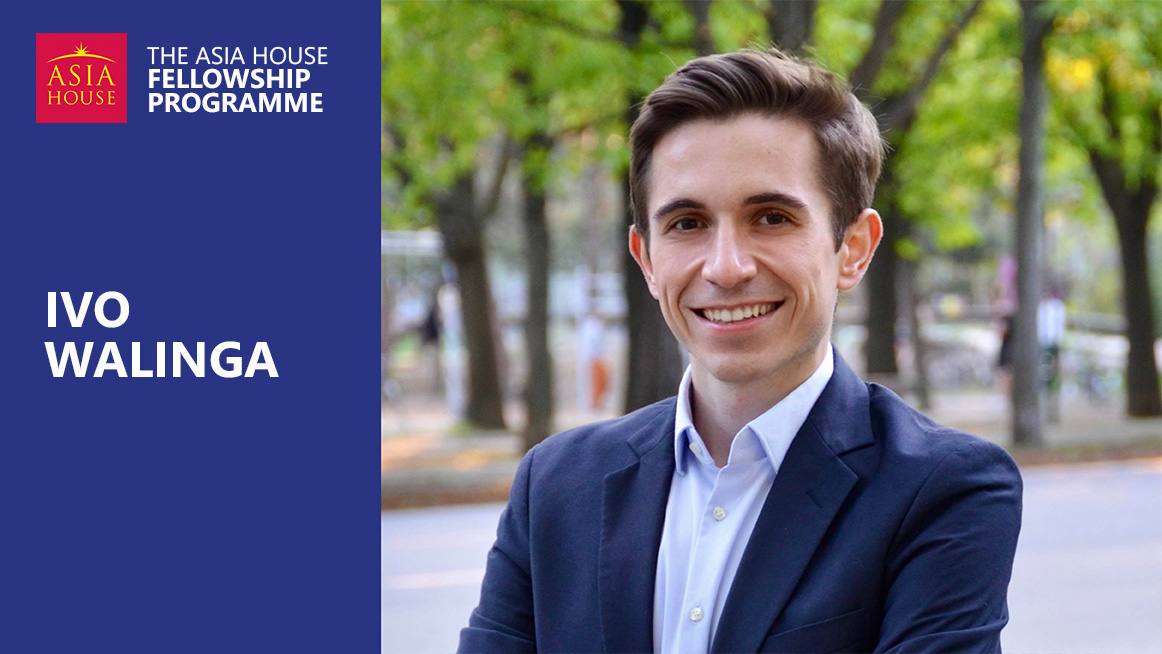Driving commercial and political engagement between Asia, the Middle East and Europe
Driving commercial and political engagement between Asia, the Middle East and Europe
Driving commercial and political engagement between Asia, the Middle East and Europe

We speak to Asia House Fellow Ivo Walinga about his upcoming research on East Asia’s climate ambitions, and their implications for regional dynamics and businesses.
East Asia’s energy transition and its implications for regional dynamics and European businesses and governments will be the focus of a new research project by Asia House Fellow Ivo Walinga.
Ivo joins Asia House in October 2022, having been selected for the think tank’s inaugural Fellowship Programme. “I’m really excited and looking forward to joining the Asia House community,” he said.
Growing up in a mining town in Eastern Europe first sparked Ivo’s interest in the socio-economic implications of energy policy. This saw him study for an MA in International Affairs and International Energy at the Paris Institute of Political Studies, before completing an MSc in Russian and East European Studies at Oxford University and an LLM, China Studies, at Peking University. He also holds a BA from University College Utrecht.
Alongside this strong academic record, Ivo also brings a range of diplomatic experience to Asia House, having served in the EU delegations to Russia and Mongolia, as well as holding research and advisory positions in Vienna and Wuhan. These experiences have given Ivo a deep appreciation of the value of research in shaping global policy.
“While working in policy and diplomacy for several years, I really felt the importance of being connected to the research community,” he said. “There is a profound need for knowledge – especially expertise that is rooted in long-term engagement with societies and regions.
“I really want to play a role in generating that knowledge.”
Ivo’s research at Asia House will focus on the climate ambitions of China, South Korea and Japan, and how their respective sustainability approaches will impact on European businesses and governments engaging with these markets. With East Asia accounting for a third of global carbon emissions, it is a crucial region for the energy transition, yet remains a key engine of growth for the world economy.
“When I was 19, I had an opportunity to spend some time in Shanghai and Taipei to do fieldwork on urbanisation and sustainability,” Ivo said. “This was my first interaction with East Asia, and I was deeply intrigued by the region’s socio-economic development and the interactions between state, policy, and society that I could observe. East Asia’s central role in global trade and security debates means we need to pay close attention to developments on the ground, and how they relate to transnational issues like environmental protection or climate change.”
Ivo subsequently spent several years living in the region to further develop his understanding of East Asia’s politics and economics. He firmly believes that the region’s complexity rules out a singular approach to the energy transition.
“We should always look first and foremost to local conditions when studying other societies and understand policies in their proper historical, social, and political context,” he said. “The same goes for climate change and how different governments decide to approach this tremendous challenge. Even within East Asia, there are similarities but also important differences in how the energy transition is viewed by various actors – governments, companies, individuals. I want to better understand what is happening on the ground, how climate considerations might impact regional cooperation in trade and investment, and finally what European governments and businesses can learn from this.”
Alongside his research interests, Ivo – who is currently based in Seoul – enjoys reading about the history of different regions and is a keen language enthusiast, with bilingual fluency in Dutch, Bulgarian and English and professional proficiency in French, Mandarin and Russian.
“Languages are the gateways to other people’s intimate worlds, shaped by traditions and shared experiences going back thousands of years,” Ivo said. “They are the link between the individual and different communities. This is why it’s important for me to engage with and learn from the linguistic and cultural traditions of the societies whose politics I study in my research.”
Ivo will begin the Fellowship in October this year, with his research set to be published in 2023.
Read more about the Fellowship Programme.
